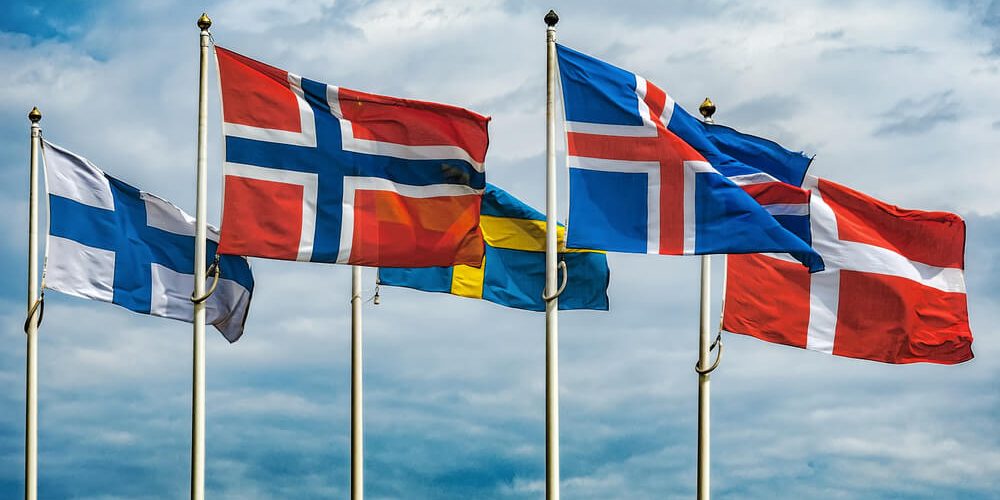Scandinavia is a northern European region that is mostly the Scandinavian Peninsula. There are four different countries in that location and they are Denmark, Finland, Norway, and Sweden. Iceland is also considered part of Scandinavia. Although each of these countries has different regulations related to gambling, the gambling industry continues to grow at a tremendous rate in the region. In this article, we will take a closer look at what the gambling activity is in each of the countries that make up Scandinavia.
Gambling In Denmark
Denmark passed their Gambling Act in 2012 and have added several amendments to it since then. The lawmakers there have an interesting take on gambling in their country. They are neutral on much of it and at first, the only licensed gambling company that was permitted to provide games was Danske Spil. However, in recent years, the market landscape has evolved and now there are several sports betting and online casino options available. As promising as that sounds, Danske Spil still holds the monopoly on most gaming activity, and other companies trying to break into the market face difficulties in getting licensed. In Denmark, the largest share of the gambling market is lotteries which total 35% with online casinos in second with a 27% share. Land-based casinos are far lower on the list with just 2%. Casino revenue in Denmark in 2020 was 2.45 billion Danish kroner, roughly 390-million USD.
Gambling In Finland
Finland has a very different approach to gambling. The government there controls both online and offline gambling with three different organizations overseeing things. Fintoto Oy is in charge of pari-mutuel horse racing, Veikkaus Oy is in charge of sports betting, the national lottery, and instant win games, and RAY controls brick-and-mortar gambling. PAF is a fourth state-run organization that controls all gambling activity in the Aland Province of Finland. The strict guidelines in place make it difficult for any private gaming operators to set up shop and Finnish gamblers are prohibited from joining any gambling site that is not based in Finland. To give you an idea of the size of the gambling market in Finland, in 2018, it was reported that Finns spent USD 336.7 million at foreign casinos like superseven.fi.
Gambling In Iceland
The first documented gambling law in Iceland was passed in 1926. It was known as the Lotteries and Tombolas Act. It was with this law that any gambling activities operated without a license were considered illegal. By 2004, the ESA (European Free Trade Association Surveillance Authority) decided that European Economic Area (EEA) agreements were being violated by the Icelandic government that restricted gambling to just domestic activities. The move prompted slight amendments to the gambling act that permitted foreign operators to reach gamblers in Iceland provided they had an Icelandic license to operate. The land-based gaming activities in Iceland continue to be restricted, however, there is not much in the way of regulation concerning online gambling and this is where many Icelanders go for their gambling fix. Estimates put the numbers in the 75% range of Icelanders who have gambled at least once in the past year.
Gambling In Norway
Norway has a lot in common with Finland concerning gambling. Both countries are strict and in Norway, there are just two companies that are licensed to offer gambling activities. They are known as Norsk Tipping and Norsk Rikstoto. The former company feeds profits from gaming back into the community with a focus on sports and culture. The latter company generates less profit as they oversee the much smaller horse racing market. It is because of this monopoly in Norway that many Norse gamblers have turned to online casinos. This prompted the government in 2010 to pass a law that saw a restriction of banking where Norwegian gamblers who frequent foreign online gambling sites cannot deposit funds to their online gaming accounts. This doesn’t cover eWallets, which has become the popular loophole to get around that regulation. Stats show that 66% of Norway’s internet gambling activity takes place at foreign gaming sites with close to USD 227 million.
Gambling In Sweden
Sweden is a completely different story. If Finland and Norway are at the one end of the scale, then Sweden is at the other (with Denmark somewhere in the middle). Relaxed is a word that best describes the approach to gambling that lawmakers in Sweden have adopted. This stance has proven to be a major benefit to the country in terms of generating revenue. Swedish players are permitted to gamble anywhere they choose, whether the site has a license from the Sweden Gambling Authority, or not. That means online casinos in other countries are open to Swedes and many target Sweden for members. Gambling companies are encouraged to apply for licensing, and the SGA will assess each applicant to see if they meet certain criteria to be licensed. The Swedish Gambling Act was established in early 2019. That changed the gambling landscape in the country as, before that, the regulations were as strict as they continue to be in Finland. In Sweden, there are just three land-based casinos and the company overseeing them is Svenska Spel which feeds all profits into the Swedish national treasury. One interesting thing to note about gambling in Sweden is that professional players are taxed 18% of their winnings.
Final Thoughts
Gambling in Scandinavia is somewhat of an adventure depending on which country you reside in. The strictest gambling laws are in Finland and Norway. The most relaxed laws exist in Sweden, where Denmark and Iceland are somewhere in the middle with regulations, but not as strict as the one end of the scale. One common theme that is shared by each country is that internet gambling has forced all of them to take a closer look at their regulations and attempt to find ways to address the technology. The challenge for Scandinavian countries is that as much as they try to regulate where residents go to gamble, online casinos will always be more attractive than what is available domestically. When you consider how much money is spent by Scandinavian gamblers, it is hard to deny that the industry is growing and will continue to do so – even if it annoys lawmakers in at least two of the countries there.









